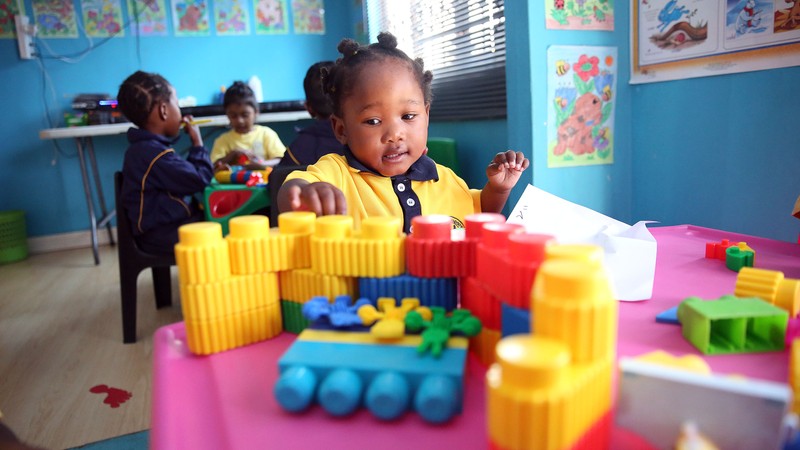If you’re a new parent returning to work, finding the right day care facility for your baby can be a daunting task. With so many options available, it’s important to choose a facility that aligns with your family’s needs and values. In this article, we will explore the different types of day care facilities, the benefits and downsides of day care, and provide you with a comprehensive guide on how to choose the best day care for your family.
Types of Day Care Facilities

There are two main types of day care facilities: group day care and in-home day care. Group day care centers are state-licensed facilities that provide care for children of various ages in a group setting. These centers often have trained and licensed staff members who provide a structured educational program for children. On the other hand, in-home day care is run by providers in their own homes and may or may not be licensed depending on the state regulations.
Benefits of Day Care
Day care can offer a range of benefits for both parents and children. Some of these benefits include:
- Continuous care: Day care centers often provide care for infants through toddlerhood and sometimes beyond.
- Education: A well-organized day care program can promote your child’s development and growth.
- Socialization: Day care allows children to interact with other children their age, fostering valuable social skills.
- Cost: Day care is often more affordable than hiring a nanny, especially if you have multiple children.
- Reliability: Most centers have extended hours to accommodate different work schedules.
- Specific to group day care: Staff members in group day care centers are trained and licensed, ensuring quality care. Additionally, multiple caregivers are available, providing backup support.
- Specific to home day care: Smaller group sizes in home day care can mean more personal attention for your child and potentially less exposure to illnesses.
Downsides to Day Care
While day care offers many benefits, there are some downsides to consider. These include:
- Cost: Day care can still be expensive, even though it is typically more affordable than private child care.
- Exposure to illnesses: Children in day care may be more prone to illnesses due to increased exposure to other children. However, this exposure can help strengthen their immune systems later in life.
- Specific to group day care: Group day care centers may have less scheduling flexibility and may be closed on holidays that follow a public school calendar.
- Specific to home day care: Some home day care providers may be unlicensed and not have the same level of quality control as licensed centers. Additionally, if the caregiver becomes sick, there may not be a backup option available.
How to Choose a Day Care
Choosing the right day care for your family requires thorough research and careful consideration. Here are some steps to help you make an informed decision:
- Do your research: Seek recommendations from other parents, your pediatrician, and online resources such as childcare referral services or state regulatory agencies.
- Interview centers: Screen potential day care centers and in-home providers over the phone. Ask about their hours, accreditation, child care philosophy, qualifications, and parent involvement.
- Visit in person: Once you have narrowed down your options, schedule visits to the day care centers. Pay attention to the environment, staff interactions with children, age group separation, cleanliness, and safety measures.
- Check references: Contact current and former clients for feedback on their experience with the day care facility.
- Drop by unannounced: Consider making an unexpected visit to the day care center to observe how it operates when the staff is not prepared for visitors.
- Ask about accreditation: Accredited day care centers meet higher standards of quality. Look for centers accredited by the National Association for the Education of Young Children (NAEYC) for group day care or the National Association for Family Child Care for home day care.
- Trust your instincts: Ultimately, trust your gut feeling about the day care facility. If something feels off, it may not be the right fit for your child.
Questions to Ask a Day Care
When researching and interviewing potential day care facilities, it’s important to ask the right questions. Here are some questions to consider:
Questions to ask every day care center:
- What is the cost and schedule?
- Is there a waiting list?
- What accreditation do you have?
- How many children do you care for at once?
- What is your child care philosophy?
- What qualifications and experience do the caregivers have?
- Are parents involved in the program?
- What are your policies regarding immunizations?
- What are the health requirements for caregivers?
- How are sick kids handled?
- What meals and snacks do you serve?
- What schedule do you follow?
Questions to ask a group day care center:
- How long have the teachers been on staff?
- How is the staff screened?
Questions to ask an in-home day care:
- Who else will be in the house when my child is there?
- What are the policies for personal emergencies and time off?
- Is there a backup option?
- Does your insurance cover my child?
What to Look for When Visiting Day Care
During your visit to day care facilities, there are several important factors to consider. Look for:
- Happy children and staff: Observe the interaction between caregivers and children. Ensure that the environment is clean and conducive to learning and development.
- A stimulating environment: Check for age-appropriate toys and engaging activities that promote learning and engagement.
- Separation of age groups: Ensure that younger children are separated from older ones to ensure their safety.
- Locked doors: Ensure that the facility has controlled access to prevent unauthorized entry.
- A clean and healthy setting: Look for clear hygiene practices, including handwashing, separate diapering and food prep areas, and sanitization of toys and utensils.
- Safety measures: Check for safety precautions such as gates on stairs, window guards, and clear evacuation plans.
Communicating with Your Day Care Provider
To maintain a positive relationship with your day care provider, it’s important to communicate effectively. Follow these tips:
- Play by the rules: Be punctual with drop-off and pick-up times and make payments on time. Notify the provider if you’ll be late or if your child is sick.
- Tune in to the right channels: Stay informed about special events and your child’s progress through newsletters, emails, or video-cams.
- Share intelligence: Provide information about your child’s preferences, needs, and any changes that may affect their day.
FAQs
Q: How do I find recommendations for a day care facility?
A: Seek recommendations from other parents, your pediatrician, or online resources such as childcare referral services or state regulatory agencies.
Q: What should I consider during a visit to a day care facility?
A: Look for happy children and staff, a stimulating environment, separation of age groups, locked doors for security, cleanliness, and adherence to safety measures.
Q: How can I maintain a good relationship with my day care provider?
A: Be punctual with drop-off and pick-up times, make payments on time, stay informed about special events and your child’s progress, and share relevant information that may affect your child’s day.
Conclusion
Choosing the best day care facility for your family is an important decision. By doing thorough research, visiting potential options, and asking the right questions, you can find a day care that meets your needs and provides a safe and nurturing environment for your child. Remember to trust your instincts and prioritize factors such as accreditation, cleanliness, and the engagement of caregivers. With careful consideration, you can make an informed choice and have peace of mind while you’re at work.

